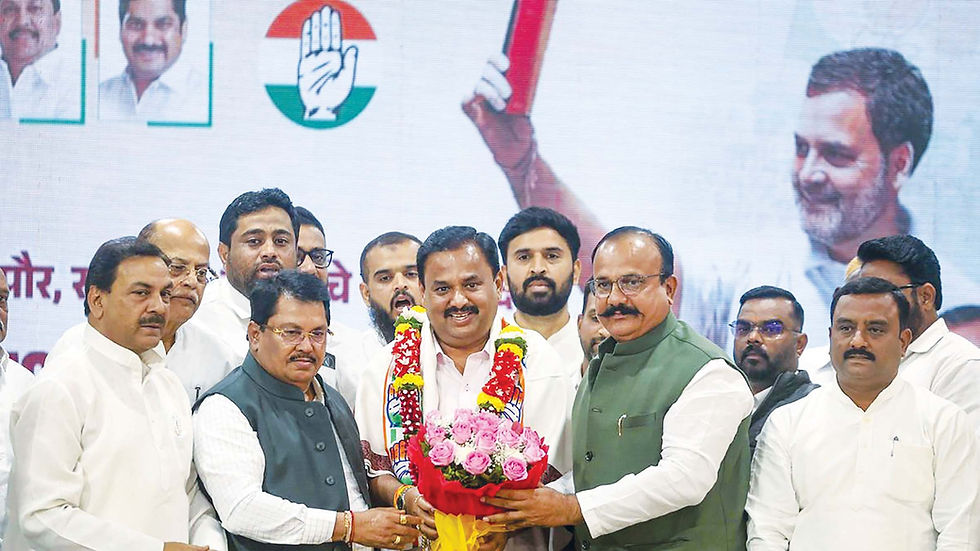The Fall of Pune’s Intellectual Citadels
- Rajendra Pandharpure

- Apr 15, 2025
- 4 min read
Once revered as bastions of public service and scholarship, Pune’s most venerated institutions now find themselves mired in controversy and crisis.

Pune: Long hailed as the ‘Oxford of the East,’ Pune has been a cultural and intellectual lodestar for modern India. Its academic institutions, research centres and civic heritage have earned it a reputation as the thinking person’s city. That reputation is now under threat.
Of these, the most sobering tale is that of the Servants of India Society and its crown jewel, the Gokhale Institute of Politics and Economics. The former was founded by Gopal Krishna Gokhale, a moral anchor of the freedom struggle and mentor to Gandhi, as a fraternity of public servants committed to national service. The latter, established in 1930, sought to become India’s answer to the London School of Economics and a sanctuary for scholarly inquiry into the political and economic problems of a newly awakening nation.
But legacy alone is no bulwark against entropy. Last week, the Governing Council of the Servants of India Society removed Milind Deshmukh from his post as secretary after allegations of financial irregularities became impossible to ignore. Deshmukh, now behind bars in Pune’s Yerwada Jail, is accused of siphoning off Rs. 1.42 crore from the Gokhale Institute through illegal means. Police say the embezzlement may be far greater in scope. A forensic audit has been ordered; Deshmukh may be pulled back into police custody for further interrogation.
This is a sad unravelling of institutions whose moral and academic authority once shaped national thinking. The Gokhale Institute, under the stewardship of economists like D.R. Gadgil and later V.M. Dandekar, was once considered sacrosanct. Scholars like Ajit Ranade, trained in that tradition, briefly served as vice-chancellor. His tenure, alas, was cut short by internal politics.
The political theatre around the institute has grown surreal. Sanjeev Sanyal, an advisor to the Prime Minister’s Economic Council, was appointed as vice-chancellor only to be removed within two days, then reappointed via a letter. These flip-flops reflect not just bureaucratic confusion, but an underlying rot that begins with governance and festers through silence and neglect.
No respect
Today, the Gokhale Institute no longer commands respect in policymaking circles. Research projects that once naturally flowed to it are now diverted to private think tanks like Tata Consultancy. What was once a temple of economic thought is now a hollow structure teetering on administrative indecision and financial disrepair.
Yet the Gokhale Institute is not alone. It shares its fall from grace with two other Pune landmarks: the Bhandarkar Oriental Research Institute and the Dinanath Mangeshkar Hospital. The Bhandarkar Institute, long a haven for Sanskrit scholars, found itself in a storm of public outrage when trustee Rahul Solapurkar made derogatory comments about Chhatrapati Shivaji Maharaj. The backlash was swift and unrelenting. Solapurkar resigned, but not before inflicting reputational damage on an institution already struggling for relevance.
Then came the tragedy at the Dinanath Mangeshkar Hospital. The death of a pregnant woman triggered waves of criticism, so loud and persistent that the state government was forced to launch an official inquiry. For a hospital associated with one of India’s most respected musical families, the episode was a public relations disaster and a poignant reminder of how thin the line between legacy and liability has become.
Effects of scandals
In Pune, where intellectual heritage is a source of local pride, the psychological toll of these scandals is beginning to show. Staff across other institutions are jittery. Whispers of administrative impropriety are now met with worried glances rather than disbelief. A city that once prided itself on being the ‘Oxford of the East’ is now reckoning with the possibility that its foundational institutions are neither incorruptible nor future-ready.
Leadership vacuums, especially in public institutions, tend to ossify into systemic paralysis. At the Gokhale Institute, this has meant fewer projects, drying funds, and students left adrift. The path forward must begin with governance reforms that prioritize transparency and merit over patronage and politicking. Fundraising, too, must evolve from passive expectation to active pursuit. Pune’s institutions must adapt their academic formats to meet the expectations of a new generation of students and scholars.
But even more than policy shifts or administrative housecleaning, what these institutions need is a reaffirmation of purpose. The Servants of India Society was not meant to be a sinecure for opportunists but was envisioned as a brotherhood of men and women who put country above self. The Gokhale Institute was not built to run on autopilot; it designed to think rigorously about India’s economic and political direction. If these places have lost their way, perhaps it is time to return to their founding ideals.
For now, Pune’s institutions, once the conscience of the nation, sit in a haze of audits and inquiries, their legacies frayed and futures uncertain. Whether they crumble further or begin again will depend not just on committees or court orders, but on a rekindling of the spirit that built them in the first place.
Their walls are old, but it is their will that must be made new.





Comments